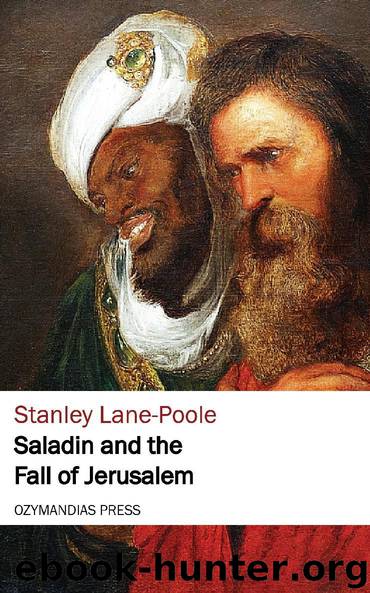Saladin and the Fall of Jerusalem by Stanley Lane-Poole

Author:Stanley Lane-Poole
Language: eng
Format: epub
Publisher: Ozymandias Press
CHAPTER XIV. JERUSALEM REGAINED, 1187.
THE SARACENS SPENT THE NIGHT of the battle in rejoicing and giving thanks. The war-cry and the credo were shouted by thousands of triumphant voices; “God is Most Great,” “There is no god but God,” was echoed from mouth to mouth until the dawn. The Moslems might well rejoice. The victory of Tiberias had laid all Palestine at their mercy. The Kingdom of Jerusalem was at an end. Its King and almost all its nobles were prisoners, and hardly a leader was left to rally the broken remnant of the Crusaders. Since they entered the Holy Land ninety years before, they had never known such disaster. It was the death-blow to their dominion, and never to this day has Christendom recovered what it lost on the memorable Feast of St. Martin. In two months, from Beyrut in the north to Gaza in the south, the whole of Palestine, save a few isolated castles of the military Orders, was in the hands of Saladin, and only Tyre and Jerusalem itself remained to bear witness that there had been a Christian kingdom. The Holy City soon suffered the fate of its dependencies.
Saladin’s first step was to take the castle of Tiberias. He went down on Sunday, the 5th of July, and the noble Eschiva, deserted by her husband and cut off from all hope of relief, could only surrender; the Sultan allowed her to depart in safety, with her children and attendants. Then, after one day’s rest, the Saracens began to spread over Palestine in a great wave of conquest. It was not so much a conquest, indeed, as a triumphal progress. The resistance was of the feeblest. The Moslems had but to appear before a town, and, like Jericho, the walls fell down – the garrison surrendered. Only a few strong castles stood a siege, and even of these hardly one held out a week. The leaders of the Franks were dead or prisoners; their army was killed, captive, or dispersed; there were no reserves, no hope of reinforcement, no one to organise resistance. The people, too, the Moslem peasants and traders, were on the side of the conquerors. They believed after their fashion in Saladin’s religion, they admired his courage and success, they recognised his clemency and even-handed justice. There were thousands of Moslem slaves in the cities who awaited with joy their liberation at his hands. Even the scattered Christian sects had less to fear from the generous Sultan than from the rapacity and tyranny of their Christian masters, to whom heresy was almost as hateful as Islam itself. With the people to support him, and no one to oppose, save a desperate garrison here and there, it is not wonderful that Saladin’s progress through Palestine was an almost uninterrupted march of triumph.
He gave the Franks no time to rally. On Wednesday, the 8th of July, 1187, four days after the battle of Hittin, he was before the strong walls of Acre; and on the
Download
This site does not store any files on its server. We only index and link to content provided by other sites. Please contact the content providers to delete copyright contents if any and email us, we'll remove relevant links or contents immediately.
| Africa | Americas |
| Arctic & Antarctica | Asia |
| Australia & Oceania | Europe |
| Middle East | Russia |
| United States | World |
| Ancient Civilizations | Military |
| Historical Study & Educational Resources |
Empire of the Sikhs by Patwant Singh(23084)
The Wind in My Hair by Masih Alinejad(5095)
Rise and Kill First by Ronen Bergman(4788)
The Templars by Dan Jones(4689)
The Rape of Nanking by Iris Chang(4211)
12 Strong by Doug Stanton(3550)
Blood and Sand by Alex Von Tunzelmann(3203)
Babylon's Ark by Lawrence Anthony(2678)
The History of Jihad: From Muhammad to ISIS by Spencer Robert(2628)
No Room for Small Dreams by Shimon Peres(2368)
Inside the Middle East by Avi Melamed(2356)
The Turkish Psychedelic Explosion by Daniel Spicer(2356)
Gideon's Spies: The Secret History of the Mossad by Gordon Thomas(2351)
Arabs by Eugene Rogan(2299)
The First Muslim The Story of Muhammad by Lesley Hazleton(2271)
Come, Tell Me How You Live by Mallowan Agatha Christie(2260)
Bus on Jaffa Road by Mike Kelly(2159)
1453 by Roger Crowley(2030)
Kabul 1841-42: Battle Story by Edmund Yorke(2029)
